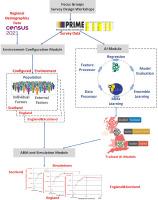一个集成的基于主体的建模和人工智能框架,用于增强少数民族社区在数字能源服务中的体验
IF 9.6
Q1 COMPUTER SCIENCE, ARTIFICIAL INTELLIGENCE
引用次数: 0
摘要
数字化在提高能源效率方面发挥着关键作用;然而,它也凸显了重大的治理挑战,并加剧了各种形式的能源不公平。本研究探讨了技术不公正如何加剧能源贫困,特别是通过数字服务获取方面的差异。重点是了解和解决少数民族(ME)社区面临的挑战,他们在获得基本的在线能源服务方面经常遇到更高的障碍。虽然以前的研究已经注意到中小企业社区在能源市场上面临的障碍,但本研究扩大了这一文献,分析了这些问题,以获得数字能源服务。该研究整合了建模、仿真和人工智能来解决这些不平等问题。该框架包括三个核心模块:人工智能、环境配置和基于代理的建模(ABM)和仿真。其主要目的是确定有效的战略、政策变化和调整,以增强在线服务体验,同时解决这些社区面临的独特挑战。AI模块使用基于集成的ML管道来开发特定区域的模型。它通过结合主成分分析、递归特征消除和超参数优化等方法来解决诸如高维数和过拟合等问题。环境配置模块通过调整数据集和区域特征来支持量身定制的模拟,确保模拟与目标社区的准确性和相关性。ABM和仿真模块有助于对策略影响和服务提供者属性进行深入分析。该框架为改善在线服务交付、促进公平和解决数字体验中的差异提供了宝贵的见解。这项工作通过量化社会技术障碍如何不成比例地影响ME社区来推进能源正义研究。本文章由计算机程序翻译,如有差异,请以英文原文为准。

An integrated agent-based modelling and artificial intelligence framework for enhancing the experience of minority ethnic communities in digital energy services
Digitalisation plays a pivotal role in enhancing energy efficiency; however, it also highlights significant governance challenges and exacerbates various forms of energy injustice. This study explores how technological injustice exacerbates energy poverty, particularly via disparities in digital service access. The focus is on understanding and addressing challenges faced by minority ethnic (ME) communities, who often encounter heightened barriers to essential online energy services. While previous research has noted barriers ME communities face in energy markets, this study broadens this literature to analyse these issues for access to digital energy services.
The study integrates modelling, simulation, and AI to address these inequalities. The framework comprises three core modules: AI, Environment Configuration, and Agent-Based Modelling (ABM) and Simulation. Its primary aim is to identify effective strategies, policy changes, and adjustments that enhance online service experiences while addressing the unique challenges faced by these communities.
The AI Module uses ensemble-based ML pipelines to develop region-specific models. It addresses issues such as high dimensionality and overfitting by incorporating methods like Principal Component Analysis, Recursive Feature Elimination, and hyperparameter optimization.
The Environment Configuration Module supports tailored simulations by adapting datasets and regional characteristics, ensuring the accuracy and relevance of the simulations to the target communities.
The ABM and Simulation Module facilitates in-depth analysis of policy impacts and service provider attributes.
This framework offers valuable insights into improving online service delivery, promoting fairness, and addressing disparities in digital experiences. This work advances energy justice research by quantifying how socio-technical barriers disproportionately affect ME communities.
求助全文
通过发布文献求助,成功后即可免费获取论文全文。
去求助
来源期刊

Energy and AI
Engineering-Engineering (miscellaneous)
CiteScore
16.50
自引率
0.00%
发文量
64
审稿时长
56 days
 求助内容:
求助内容: 应助结果提醒方式:
应助结果提醒方式:


